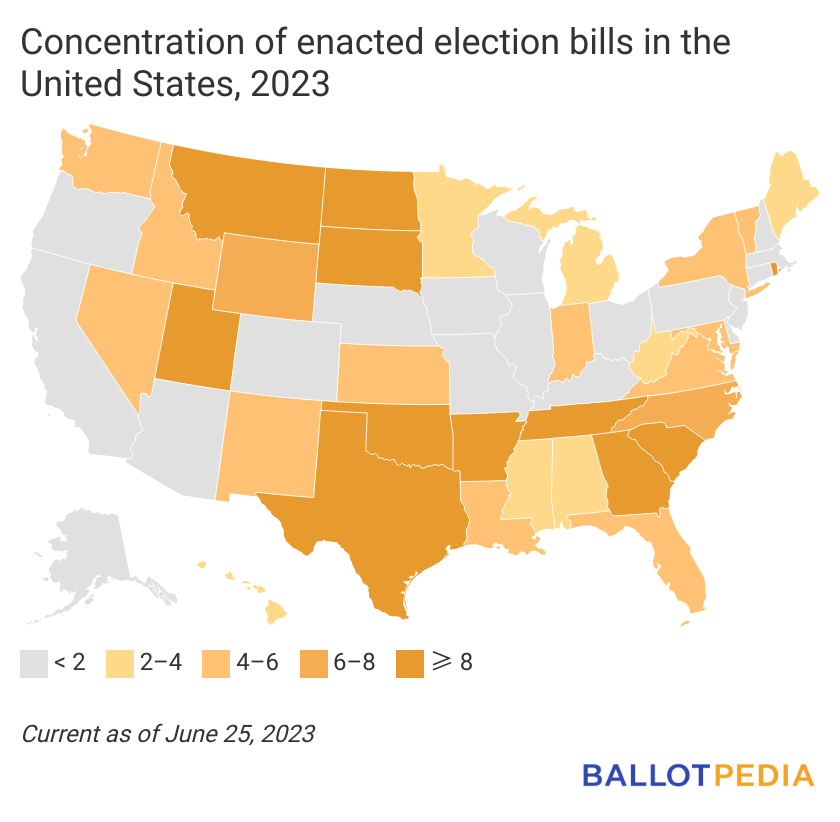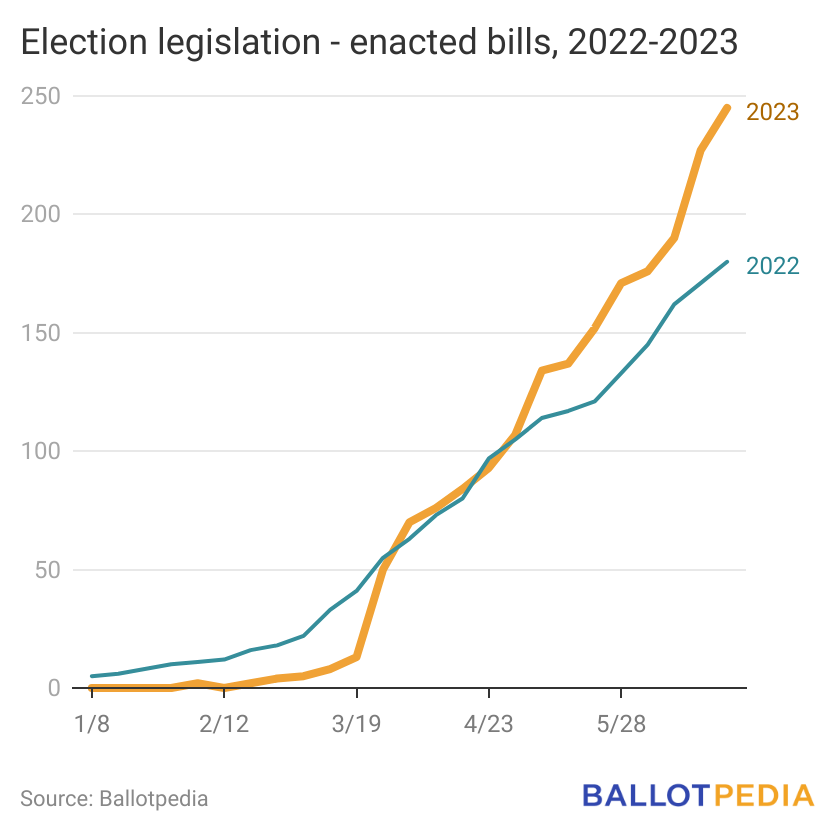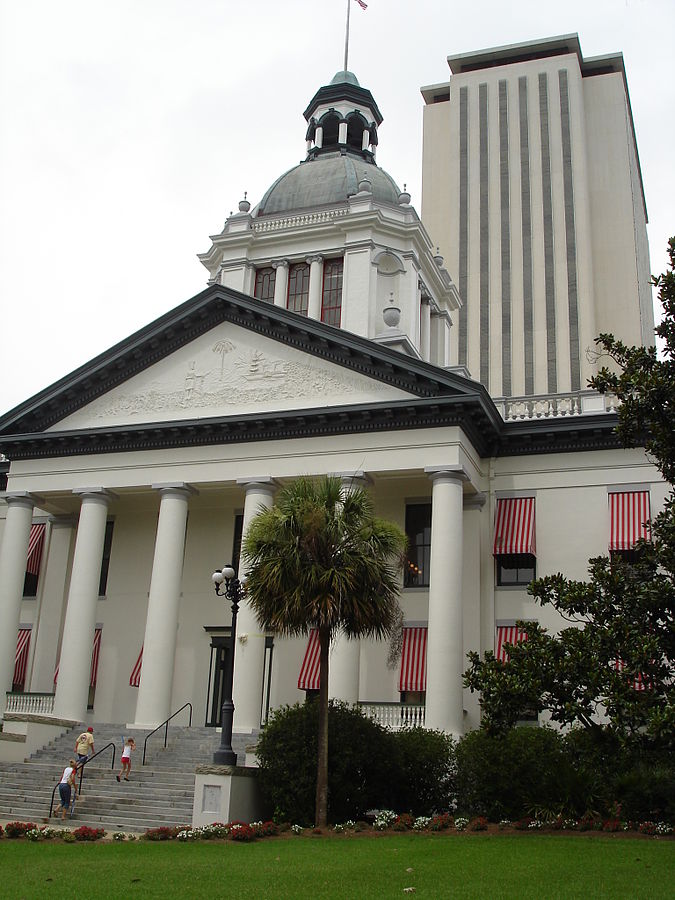As of June 25, members of the Florida State Legislature, which includes the Florida House of Representatives and the Florida State Senate, have passed seven bills related to election administration since the beginning of the year. Of those seven bills, five have been enacted. This is two more than this point a year ago. Republicans sponsored the five bills. The bills are:
- FL H0945: Jupiter Inlet District, Palm Beach County, Rep. John Snyder (R).
- As amended, this bill:
- Establishes that Jupiter Inlet District will continue to be known as such.
- Outlines the boundaries of Jupiter Inlet District.
- Provides that the district has power to enter into contracts; levy taxes on property, with certain stipulations; issue bonds, with certain stipulations; exercise eminent domain; acquire land through various methods; maintain and construct channels; construct canals, sediment basins, bridges, highways, docks, wharves, and the like; to collect fees for use of property; and to use, develop, or lease property.
- Outlines the structure of the governing body, a board with five commissioners, and clarifies that the present commissioners will continue to serve until their terms expire.
- Establishes that elections for commissioners will be nonpartisan, with numbered seats and staggered four-year terms beginning and ending in the month of January, and held during the general election in even-numbered years.
- Click the hyperlinked bill number above for more information.
- As amended, this bill:
- FL H0031: Partisan Elections for Members of District School Boards, Reps. Webster Barnaby (R), Fabian Basabe (R), Dean Black (R), Randall Fine (R), Mike Giallombardo (R), Thomas Leek (R), Ralph Massullo (R), Jenna Persons-Mulicka (R), Alejandro Rizo (R), Spencer Roach (R), Rick Roth (R), Joel Rudman (R), Michelle Salzman (R), Tyler Sirois (R), and Dana Trabulsy (R).
- This joint resolution proposes amendments to the Florida Constitution—an amendment to Article IX Section 4 and a new section in Article XII—that would require school board members to be elected in partisan elections beginning in the November 2026 general election and allow for partisan primaries ahead of the 2026 election. This is a legislatively referred constitutional amendment for voters to decide at the 2024 general election.
- FL H1175: Sarasota County, Reps. Fabian Basabe (R) and James Buchanan (R).
- This is an omnibus-style election policy bill that affects a number of different policy areas. As amended, this bill:
- Creates the Three Rivers Stewardship District in Sarasota County, to be a single, special, limited-purpose independent special district.
- Provides that a referendum to establish the district is not required, but that the district is created instead by this act.
- Provides that the Board of Supervisors will consist of five members who serve four-year terms after the initial transition period, with certain residency and citizenship requirements.
- Outlines the initial election of the Board of Supervisors, including notification requirements and a meeting of landowners with instructions for choosing a chair, nominating candidates, quorum, and voting requirements.
- Provides that each landowner is entitled to one vote per acre of land owned in the district of each person to be elected, and that the vote may be in person or via proxy in writing with specific requirements and rules.
- Click the hyperlinked bill number above for more information.
- This is an omnibus-style election policy bill that affects a number of different policy areas. As amended, this bill:
- FL S7050: Elections, Sen. Travis Hutson (R).
- This is an omnibus-style election policy bill that affects a number of different policy areas. As amended, this bill:
- Makes signature matching mandatory, requires anyone conducting signature matching to be trained, and requires the secretary of state's office to adopt related rules and procedures.
- Adds that a third-party voter registration organization, unaffiliated with a political party, must provide certain information to the division where they will be registering people to vote, in addition to certain other previously created provisions, and provides that the organization’s registration expires at the end of the election cycle.
- Stipulates that any person handling voter registration applications for a third-party organization must be a U.S. citizen and must not have been convicted of a felony.
- Requires the third-party voter registration organization to provide a receipt to each applicant and outlines related requirements.
- Modifies the deadline for the registrations to be delivered to the elections office from 14 days after application to 10 days after, and sets a maximum fine of $2,500 for each day delivery of the registrations are late.
- Click the hyperlinked bill number above for more information.
- This is an omnibus-style election policy bill that affects a number of different policy areas. As amended, this bill:
- FL S0004: Statewide Prosecutor, Sen. Jonathan Martin (R).
- As amended, this bill:
- Provides that the Department of Legal Affairs in the Office of Statewide Prosecution will investigate any crime involving voting in federal, state, referendum, initiative, and issue elections, as well as any petition activities for said elections.
- Provides that the Department of Legal Affairs in the Office of Statewide Prosecution will investigate any crime involving voter registration.
- Provides that the Department of Legal Affairs in the Office of Statewide Prosecution will investigate any attempt, solicitation, or conspiracy to commit related crimes.
- Empowers the office to act in specified circumstances.
- Requires information and indictments to contain general allegations stating where the crimes are alleged to have occurred.
- As amended, this bill:
From June 19-25, legislators passed six bills related to election administration nationally. As of June 25, Texas legislators have passed the most bills this year with 34, while legislators in nine states have passed none. The state with the most enacted bills is Texas with 32, while 12 states have enacted none.


The Florida State Legislature was scheduled to be in regular session from March 7 to May 5 this year. In 2022, Florida legislators passed four election-related bills, all in the state Senate. Three of the bills were enacted into law. Florida is a Republican trifecta, meaning Republicans control the governorship and both chambers of the state legislature.
Additional reading:



